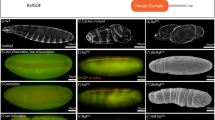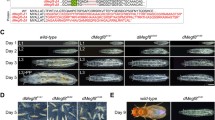Abstract
Mutations altering the spatial pattern of embryonic primordia are valuable tools for studying the earliest steps of embryonic pattern formation. As the spatial organisation of the egg cell arises during oogenesis, such mutants are likely to affect the embryo via the maternal genome (maternal effect). In Drosophila, most maternal-effect mutants studied so far lead to early developmental arrest. A few others yield pattern defects apparently linked to local failure of blastodermal cellularisation rather than to abnormal arrangement of primordia or ooplasmic determinants1,2. A small number of mutants, however, are known in which the embryonic fate map is affected, for example, bicaudal3,4, which profoundly alters the antero-posterior pattern of embryonic organisation. The bicaudal phenotypes suggest that the mutation causes a perturbation of a morphogen gradient that defines the antero-posterior coordinate in early embryonic pattern formation5,6. A new maternal-effect mutant, dorsal, seems to exert a similar influence on the dorso-ventral coordinate for patterning6. Dorsal (dl) has both a recessive and a dominant maternal-effect phenotype. The dl recessive phenotype is marked by an apparently complete lack of dorso-ventral polarity from early embryogenesis onward6. The dl dominant (dlD) phenotype, which we report on here, is temperature sensitive: at 22 °C, dl/+females lay eggs which develop normally while eggs produced at high temperature (29 °C) yield abnormal larvae which fail to hatch. These mutant dlD larvae vary in phenotype but nearly always lack muscles and frequently part of the ventral hypoderm. They are defective in structures that arise from the ventral region of the blastoderm in normal embryogenesis6,7 (Fig. 1).
Similar content being viewed by others
References
Zalokar, M., Audit, C. & Erk, I. Devl Biol 47, 419–432 (1975).
Rice, T. B. & Garen, A. Devl Biol. 43, 277–286 (1975).
Bull, A. L. J. exp. Zool. 161, 221–241 (1966).
Nüsslein-Volhard, C. Roux's Archiv. 183, 249–268 (1977).
Sander, K. Adv. Insect Physiol. 12, 125–238 (1976).
Nüsslein-Volhard, C. in Determinants of Spatial Organisation (eds Subtelney, S. & Konigsberg, I. R.) 185–211 (Academic, New York, 1979).
Poulson, D. F. in Biology of Drosophila (ed. Demerec, M.) 168–270 (Hafner, New York, 1950).
Cremer, C., Zorn, C. & Cremer, T. Microsc. Acta 75, 331–337 (1974).
Lohs–Schardin, M., Cremer, C. & Nüsslein–Volhard, C. Devl Biol. 73, 239 (1979).
Lindsley, D. L. & Grell, E. H. Genetic Variations of Drosophila melanogaster (Carnegie, Washington, 1968).
Mahowald, A. P. & Turner, F. R. Scanning Electron Microsc. 11, 11–19 (1978).
Author information
Authors and Affiliations
Rights and permissions
About this article
Cite this article
Nüsslein-Volhard, C., Lohs-Schardin, M., Sander, K. et al. A dorso-ventral shift of embryonic primordia in a new maternal-effect mutant of Drosophila. Nature 283, 474–476 (1980). https://doi.org/10.1038/283474a0
Received:
Accepted:
Issue Date:
DOI: https://doi.org/10.1038/283474a0
- Springer Nature Limited
This article is cited by
-
Loss of Drosophila i-AAA protease, dYME1L, causes abnormal mitochondria and apoptotic degeneration
Cell Death & Differentiation (2016)
-
The subcortical maternal complex controls symmetric division of mouse zygotes by regulating F-actin dynamics
Nature Communications (2014)
-
Recollections of a scientific journey published in human genetics: from chromosome territories to interphase cytogenetics and comparative genome hybridization
Human Genetics (2014)
-
The immune response of Drosophila
Nature (2003)
-
Drosophila innate immunity: an evolutionary perspective
Nature Immunology (2002)





